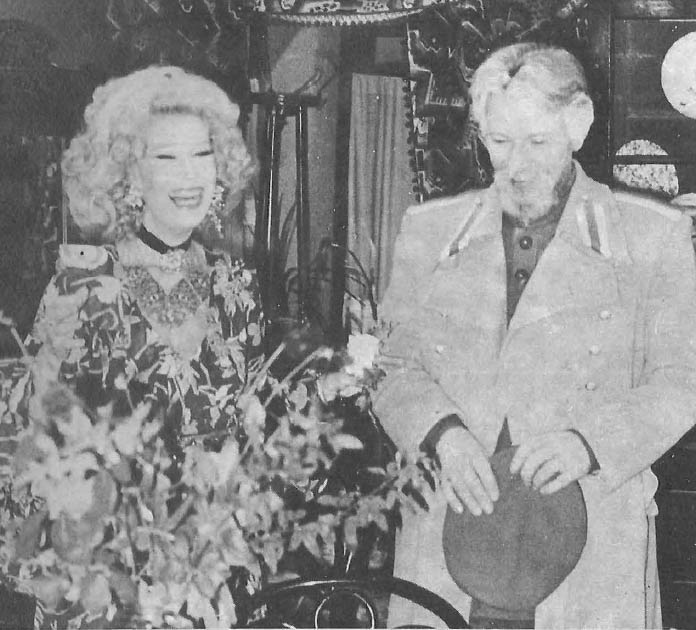
There is a kind of wistfulness in her voice when she says this because she herself got married at the tender age of seventeen and only started doing her thing when her children didn’t need her any more and when she was quite sure her husband wouldn’t mind.
Jessica Dublin is now an experienced and successful actress who has appeared in close to fifty films, not to mention several television shows and commercials, and musical comedies on the stage. But when she speaks about herself you can’t help detecting a trace of regret that she didn’t start earlier and “what might have been” if she had.

Although Jessica may not have reached the dizzy heights of stardom, she seems to have achieved something that few of the Hollywood “greats” have managed to attain. From the age of seventeen she has been married to the same man and is looking forward to many more years of conjugal bliss with her husband, Max Dublin. They have two grown children who have both embarked on successful careers – a daughter who is an assistant professor of economics at Alabama University and a son who is a petroleum engineer in Laredo, Texas.
Jessica was born in New York of Hungarian parents. Her mother was a cellist, and although her father was more prosaically engaged in the construction business, there was an artistic atmosphere in her home. Her uncle was a violinist and her parents’ friends were musicians, dancers, conductors and other people associated with the performing arts. She took piano lessons and wanted to learn to dance but her mother was afraid that dancing might lead her to the stage and she said “no” to dancing lessons.
“But,” Jessica says, “I saved up the money I earned as a babysitter and took dancing lessons without my mother’s knowledge. Dancing is such a wonderful thing. It teaches you music, discipline and how to move gracefully. If you can do all that and they give you a few lines to speak-then you can act! The music makes you feel, gives you a mood. I always feel I can act better when there is music in the background.”
Then Max Dublin turned up and Cupid shot his bolts. Jessica said aurevoir but not goodbye to the arts and went around the world with her husband, an electrical engineer whose job has taken him to many different countries.
In Rome in the early sixties, she began to study at the Arts Academy. Through a colleague at the Academy she met an actress who was working at the Cinecitta. Jessica visited the studios with her one day-and proceeded to catch the eye of an Italian director. Very soon, Jessica found herself acting regularly in Italian films and “spaghetti westerns”. She had bit parts in many films-including Catch 22 and Fellini’s Satyricon and co-starred wi.th Joe Namath in ‘The Last Rebel’ and with Terence Hill and Bud Spencer Jr. in ‘They Still Call Me Trinity’. She has played a variety of parts including a prostitute, a rich divorcee, an inveterate gambler, a fun-loving American, a bordello madam, a flirtatious tourist, a Sicilian mother, a witch and a gangster’s moll.
Before she could speak passable Italian, she would learn her lines phonetically with the help of a friend and listen carefully for her cue. But when actors like Ugo Tognaizi were allowed the privilege of ad-libbing their lines before the camera so that the cue word was never spoken, she received a swift kick in the off-camera shins.
Eight years ago Jessica’s husband was transferred to Athens and it wasn’t long before she got involved in Greek movie-making. She has had English speaking roles in Greek films made for export and has also performed on the stage, playing Hecuba in Euripides’ Trojan Women, Queen Agave in The Bacchae and Arhodia in Stratis Karras’s The Strong Men, all sponsored by foreign institutes in Athens.
Jessica is currently acting in Colonel Liapkin, a Greek television series based on the novel by M. Karagatsis. She has the comic part of an Austrian woman named Frau Mitsi and once again, as in her early years in Italy, she has to learn her Greek lines phonetically with the aid of a tutor and a tape recorder.
Another difficulty is the fact that her director, Vassilis Georgiades, doesn’t speak English. Jessica says: “He is very good to me. We communicate in French or Italian and he allows me to say some of my lines in German, provided they are repeated in Greek by someone else in the scene so Greek audiences can understand what I have said.”
Jessica puts so much of herself into her roles that, she says, at the end of a day’s shooting she feels emotionally drained. If she is, it doesn’t seem to last very long because all who meet her agree that there’s so much vitality bubbling out of her all the time, it seems to refresh her and everyone else in the immediate vicinity, · giving them the same zest for life that fills Jessica.







